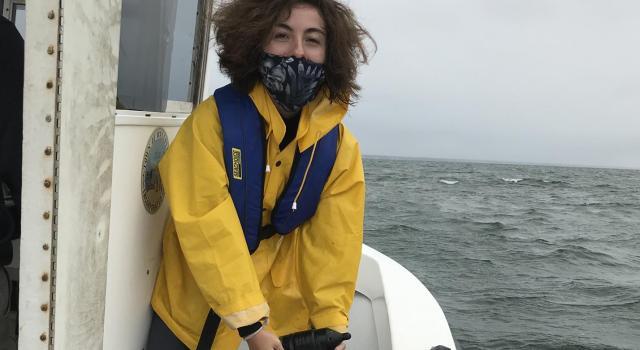Animal Behavior and Cognition
Cognitive scientists and biologists want to understand how the minds and brains of animals work, how they evolved, and what they can tell us about the human mind and brain.
Animal science students can take courses in general animal behavior, animal cognition, communication, and evolution. Students also can investigate anatomy, physiology, biochemistry, genetics, ecology, and other related fields.
For hands-on experiences with animals, students across the College are encouraged to spend time at the Hampshire Farm Center, interacting with sheep, goats, and llamas.
Sample Student Project Titles
- Apple Maggot Fly Response to Sticky Red Spheres
- Arboreal Behavior in New Guinea Singing Dogs
- Are Chimps Cultured?
- Behavior and Environment: Will Mirrored Kennels Reduce Negative Behaviors and Help More Dogs Find Good Homes?
- Foraging Behavior in the Arboreal Boid Corallus Grenadensis on Grenada and a Researcher's Photographic Essay
- Frog Malformations: A Look at Possible Causes
- Howl, Growl, Whine, Whimper, and Woof: A Study in the Barking Frequency of the Vocal Communication in Blue Jays
- Domestic Sheep: A Two Part Bioacoustic Study. Mating Calls in Pseudacris Crucifer (Spring Peeper)
- The Reintroduction of the Gray Wolf in Yellowstone National Park
Sample First-Year Course
Apes and Language
We humans are the only great apes that learn and use language naturally. Why is that? Does language require genes that are unique to us? Does it require a brain as large as ours? Is it a special product of human culture? We'll look at several decades of experimental efforts to get nonhuman primates such as chimpanzees, gorillas, and orangutans to learn and use something like human languages, examine naturally-occurring primate communication systems, and think about a wide selection of cognitive, evolutionary, and other biological issues that bear on these matters.
Sample Courses at Hampshire
- Animal Behavior Across the Senses
- Animal Behavior Seminar
- Animal Behavior & Robotics
- Animal Cognition
- Animal Thinking
- Apes and Language
- Behavior and Evolution of Domestic Animals
- Behavioral Ecology of Birds
- Cognitive Ethology
- Ecology
- Ever Since Darwin
- Evolution of Behavior
- Evolution of Cognition
- Field Methods
- Primate Behavior
Through the Consortium
- Adaptation and the Organism (AC)
- Advanced Studies in Zoology (SC)
- Animal Physiology (AC)
- Chemical Communication in Vertebrates (MHC)
- Farm Animals: Care & Welfare (UMass)
- Histology (SC)
- Laboratory in Behavioral Neuroscience (MHC)
- Macroevolution (MHC)
- Neurobiology (AC)
- Nutrition of Captive Wildlife Species (UMass)
- Vertebrate Biology (SC)
Facilities and Resources
The Hampshire College Farm Center
A working farm, as well as a research, education, and outreach facility, the Hampshire College Farm Center is dedicated to sustainable agriculture.
Created in the late seventies as an experimental project of the faculty, the Farm Center continues to be a place where students and faculty integrate science and alternative technology as a means for testing sustainable methods of farming.
In addition, the Farm Center serves the College as a living laboratory for research and teaching on sustainable agriculture and the interdependence of health, food, and environment. Many students work at the center with animals, vegetables, and the CSA (Community Supported Agriculture) Program.
The College campus also contains hundreds of acres of undisturbed forest and wetlands that serve as an ideal natural laboratory for the study of birds such as chickadees, robins, owls, and raptors; amphibians such as wood frogs and spring peepers; and mammals such as rabbits and coyotes.
The Hampshire Bioshelter
The Hampshire Bioshelter provides additional opportunities for research in aquaculture and marine ecology. Extending from the side of the Cole Science Center, our bioshelter is the first such academic facility built in the northeast.
The Five College Coastal and Marine Sciences Program
The Five College Coastal and Marine Sciences Program helps to support the bioshelter, which provides a wide range of research and study opportunities in ecology, hydroponics, aquaculture, genetics, and renewable energy sources. In addition, the program sponsors student seminars and internships at, or with the support of, the Marine Biological Laboratory at Woods Hole.



